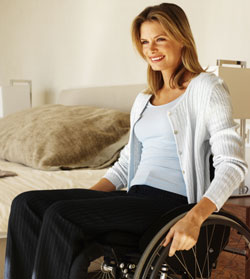|
 Violence is a serious problem for many
women with disabilities. Violence is a serious problem for many
women with disabilities.
Two small studies by the Center for
Research on Women with Disabilities (CROWD) at Baylor College of Medicine found
10 to 13 percent of women with disabilities reporting being abused within the
past year, a rate similar to that of women without disabilities. But women
with disabilities were more likely to be abused for longer periods of time.
They were also abused by a wider variety of people, such as health-care
providers, strangers, or attendants, in addition to partners or family members.
Women with disabilities experience the
types of physical and mental abuse women in general do. But they also are
subject to unique forms of abuse: caretakers have been reported
withholding medicines and assistive devices, such as wheelchairs or braces, or
being refused essential care.
Women with disabilities need to know
about resources that can help them if they are abused. Few women with
physical, visual, or hearing disabilities use battered women's services,
according to another CROWD study. The study suggested that many shelters
may be accessible to women with physical disabilities but may not reach out to
them or offer services such as sign language interpreters or personal care
attendants.
Health-care providers can routinely
screen for abuse by asking four simple questions:
Within the last year,
-
Have you been hit, slapped, kicked,
pushed, shoved, or otherwise physically hurt by someone?
-
Has anyone forced you to have sexual
activities?
-
Has anyone prevented you form using
a wheelchair, cane, respirator, or other assistive device?
-
Has anyone you depend on refused to
help you with an important personal need such as taking your medicine, getting
to the bathroom, getting out of bed, bathing, getting dressed, or getting food
or drink?
Source: Center for Research on
Women with Disabilities at Baylor College of Medicine
[Return
to Top]
|